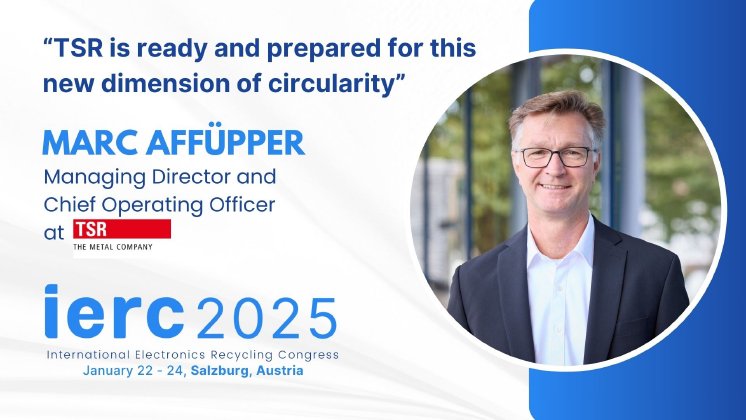ICM: Can you tell us about TSR’s core business
Marc Affüpper: With revenues of around €5 billion per year and around 4.500 employees, TSR belongs to one of the biggest metal recycling companies worldwide. It has been active in Europe since 1890 and today belongs to the family-owned Remondis Group based in Lünen, Germany. The Group’s main activities include recovering raw materials from waste and developing innovative recycled products.
ICM: What is the importance of WEEE Recycling for TSR overall?
Marc Affüpper: We know that the future demand for secondary raw materials will grow significantly over the next few years. Limited global resources in combination with the need for a reduction of CO2 emissions will oblige industry to drastically reduce its consumption of primary raw materials. Unfortunately the availability of recycled materials is not predicted to grow significantly so we will face a huge deficit, and in consequence the sourcing of secondary raw material-containing waste will be key to many businesses’ future success.
TSR is traditionally strong in sourcing and processing metal-containing waste such as municipal scrap, car bodies, demolition scrap and metal-rich production scrap. WEEE contains a huge amount of metals as well and is a globally growing waste stream. We have the experience and the technical expertise to process this stream, guaranteeing an efficient depollution and recovery of the metals and other valuable content. The metals are separated and upgraded as required in a defined way in order to generate suitable recycled raw products for our strategic customers, so increasing their recycled content year on year.
Our group is also benefitting from a huge amount of synergies in our processes. The steel and metal origin of our traditional infeed is often the same as that from WEEE, there are similarities in the logistics and mechanical processes, and intermediate qualities of both processes can be upgraded in similar sites before delivery to the steelworks of smelters.
ICM: What makes WEEE-Recycling at TSR extraordinary compared to other recycling companies?
Marc Affüpper: TSR was founded in1890 so is a recycling company with a very long tradition. With a presence in many European countries it is one of the few recyclers who are able to source the needed volumes of metal-containing waste to operate huge and complex recycling processes at competitive costs. If a car manufacturer or a white goods manufacturer decides to have a defined percentage of recycling content in all of its products, the amount of recycled raw material required will be huge. The challenge is to have the necessary volumes of a specific quality of material available at any time. This will be a game-changer for those recyclers who are involved in strategic cooperation with OEMs from the electronic goods or the automotive sectors. The importance and the complexity of the supply chain will take on a much greater importance than we are used to in today’s recycling world. TSR is ready and prepared for this new dimension of circularity.
ICM: How innovative are the TSR processes used for WEEE-Recycling?
Marc Affüpper: Within TSR there are several different technologies in use. We operate 11 sites in Europe processing in total more than 400.000t/a of WEEE. Our technicians have developed a lot of know- how. In Lünen for example we have been operating a new fridge recycling line since 2022, producing very clean metal and plastic fractions and achieving great recovery rates for CFCs. Our new TSR shredder line in Duisburg was inaugurated in 2023. It is equipped with state of the art air cleaning systems and able to produce TSR 40. This is a secondary raw material for the steel industry with clearly defined criteria and allows steel works to significantly increase the recycled content of their products, saving natural resources and immediately reducing the CO2 footprint.
ICM: How does TSR see the near future for the recycling business with view to the experiences of the recent years and developments we face today?
Marc Affüpper: Due to the need for a reduced CO2 footprint and globally limited resources, we are seeing much more serious interest in our services and cooperation from raw material producers and manufacturers. We are convinced that this is a sustainable development and that the recycling industry in total will be much more in focus in future.
It is now up to us as a business sector to keep on developing and improving on what we are doing. But it is also up to the legislators to ensure that the appropriate legal framework is put in place in order to keep up the momentum. From the past we know that in a weak economy, ecology and sustainability are not the first priorities unless there is a legal demand for it. Legislators can influence these developments to a certain extent by giving clear guidance to industry and consumers, enabling us to continue developing innovative, more circular processes with the same dynamic as in recent years.
Conferences like IERC are a chance to send out these key messages and to communicate to all stakeholders. This is why we like to join this traditional conference once a year.


